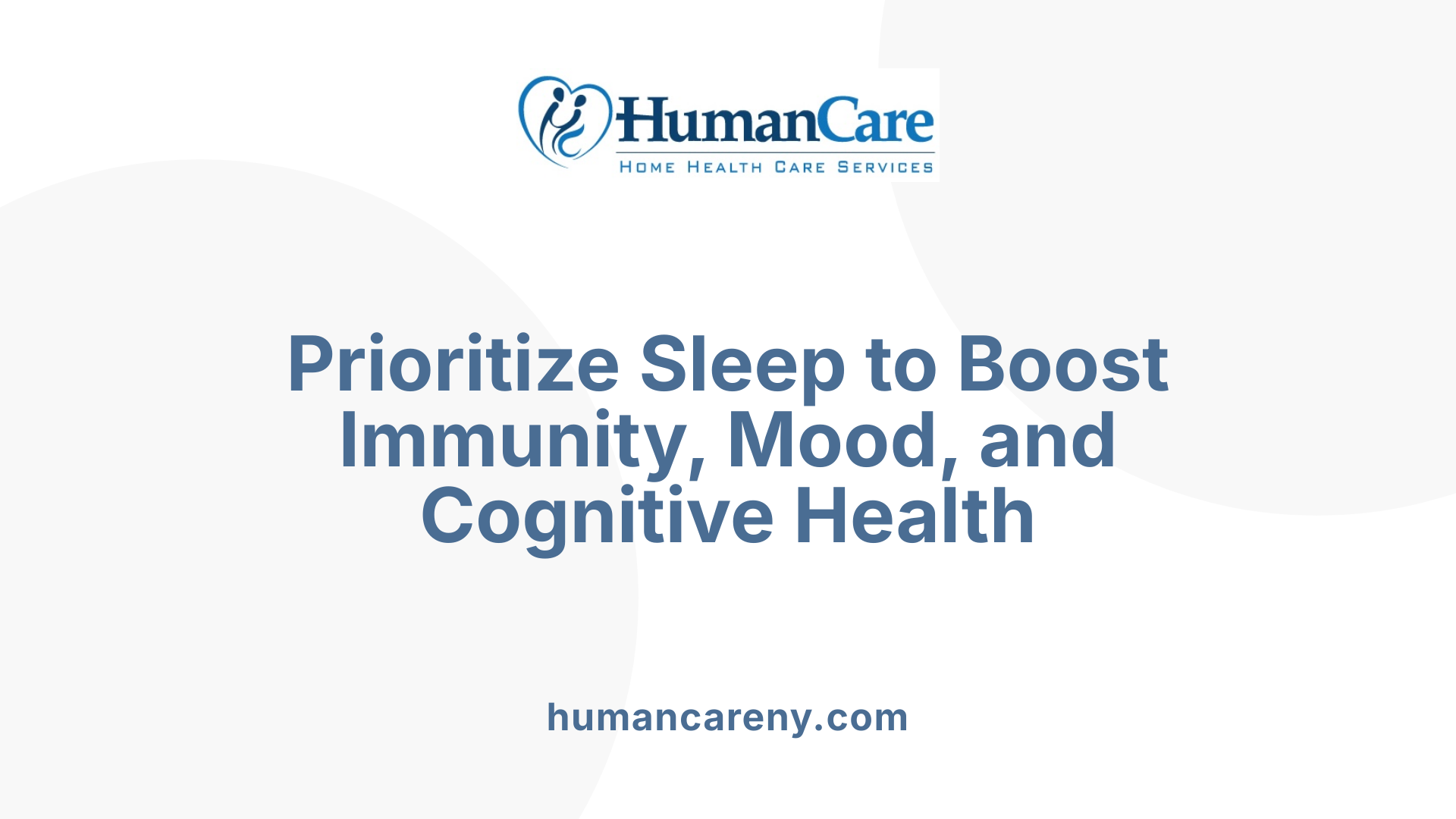Understanding the Importance of Sleep for Seniors
Sleep is essential for maintaining physical health, emotional well-being, and cognitive function in older adults. Despite its importance, many seniors experience sleep disturbances that can significantly impact their quality of life. Home care services play a vital role in addressing these issues by providing tailored support to promote healthier sleep patterns. This article explores the effective strategies and interventions that home caregivers utilize to help seniors achieve restful and restorative sleep, thereby enhancing their overall health and daily functioning.
Establishing Routine and Consistent Sleep Schedules

What are effective ways to help an elderly person fall asleep and stay asleep?
Helping seniors achieve better sleep starts with creating routines and maintaining consistency in their daily schedules. Setting regular bed and wake times helps regulate their internal body clock, also known as the circadian rhythm. When an elderly person goes to bed and wakes up at the same times each day, it reinforces their body's natural sleep-wake cycle, leading to more restful and consolidated sleep.
A calming nightly routine can signal to the brain that it is time to wind down. This could involve activities like reading a book, listening to soothing music, or taking a warm bath before bedtime. Avoiding screens—including TVs, computers, and smartphones—at least an hour prior to sleep is essential, as the blue light emitted can interfere with melatonin production, which is crucial for sleep.
Optimizing the bedroom environment also plays a vital role. The room should be kept cool, dark, quiet, and comfortable. Use blackout curtains, earplugs, or white noise machines if necessary to eliminate disruptive noises and light.
Encouraging daily physical activity and exposure to natural light during the day can promote better sleep at night. Activities such as walking, gardening, or gentle stretching are helpful, but strenuous exercise close to bedtime should be avoided.
Lifestyle factors also support good sleep. Limiting large meals, caffeine, and alcohol before bedtime can prevent sleep disruptions. Short naps earlier in the day—preferably 20-30 minutes—can prevent interference with nighttime sleep.
If sleep problems persist despite these adjustments, consulting healthcare professionals may be necessary. In some cases, behavioral therapies like cognitive-behavioral therapy for insomnia (CBT-I) provide effective non-drug options for improving sleep.
How does consistency benefit the regulation of the circadian rhythm?
Maintaining consistent sleep and wake times helps synchronize the circadian rhythm—the body's internal clock that regulates sleep, hormone release, and other bodily functions. When this rhythm is stable, seniors experience fewer awakenings during the night and wake feeling more refreshed.
Regular routines reinforce sleep cues, such as routine cues like bedtime rituals and meal times, which prime the body for sleep and alertness at appropriate times. Proper exposure to natural light during the day also supports this, helping to reset the circadian rhythm and maintaining its natural phase.
Disruptions or irregular sleep patterns can cause phase delays or advances, leading to difficulties falling asleep or waking too early. These disruptions are common in older adults due to medical conditions, medication side effects, or lifestyle factors, but establishing consistent routines can mitigate these effects.
Overall, routine and consistency are vital strategies that contribute significantly to healthy sleep patterns, emotional stability, and physical health in seniors.
Creating a Sleep-Conducive Environment

What are effective ways to help an elderly person fall asleep and stay asleep?
Creating an ideal sleep environment is essential for seniors to enjoy restful and uninterrupted sleep. One of the most straightforward strategies is to optimize the bedroom's physical conditions.
Firstly, maintaining an optimal room temperature, generally between 60-67°F (15-19°C), helps regulate body temperature and promotes better sleep. Excessively warm or cold environments can cause discomfort, leading to frequent awakenings. Using a fan, heater, or adjustable thermostat can help tailor the room temperature.
Lighting plays a significant role in circadian rhythm regulation. Installing blackout curtains or using sleep masks effectively blocks out early morning light or streetlights, signaling to the body that it is time to rest. Avoiding bright lamps and using dim, warm lighting in the evening can facilitate the transition to sleep.
Reducing noise is equally vital. Earplugs, white noise machines, or fans can mask disruptive sounds. A clutter-free, calm bedroom environment minimizes stress and distractions, making it easier for seniors to relax.
Supportive bedding also contributes to sleep quality. Choosing a comfortable mattress and pillows aligned with personal preference reduces physical discomfort and prevents soreness or pressure points. Supportive yet soft bedding helps maintain spinal alignment, which is especially beneficial for seniors with joint or arthritis issues.
Implementing these environmental improvements creates a serene sleep space that not only encourages falling asleep but also helps sustain deep, restorative sleep throughout the night. With a well-designed bedroom, seniors can enjoy better health, mood, and cognitive function.
For further guidance, the term "Bedroom environment optimization for seniors sleep" is often searched online to explore tailored suggestions and expert advice on making bedrooms more sleep-friendly for older adults.
Addressing Medical Conditions and Sleep Disorders

What are effective ways to help an elderly person fall asleep and stay asleep?
Supporting seniors in achieving restful sleep involves multiple practical strategies. First, maintaining a consistent sleep schedule—going to bed and waking up at the same time daily—helps regulate their internal clock and improve sleep quality. This consistency is crucial, even on weekends, to reinforce circadian rhythms.
Creating a calming bedtime routine signals to the body that it’s time to wind down. Activities such as reading a book, listening to soothing music, or taking a warm bath can promote relaxation. It’s also important to avoid screens, tablets, or bright lights at least an hour before bed, as they can interfere with melatonin production and delay sleep onset.
Optimizing the bedroom environment plays a vital role. Ensuring the room is cool, dark, quiet, and comfortable helps to establish a sleep-conducive atmosphere. Use blackout curtains, earplugs, or white noise machines if necessary.
Encouraging daily physical activity and getting natural light during the day can enhance sleep drive. Conversely, it’s advisable to avoid large meals, caffeine, and alcohol close to bedtime, and to restrict naps to earlier in the afternoon to prevent disrupting nighttime sleep.
In cases where sleep issues persist despite these measures, it’s wise to seek medical advice. Healthcare professionals may recommend therapies such as cognitive-behavioral therapy for insomnia (CBT-I) or utilize sleep monitors to analyze sleep patterns. Addressing underlying medical conditions and reviewing medications with a healthcare provider are important steps in managing sleep problems.
By combining good sleep hygiene practices with medical oversight, caregivers and families can significantly improve the sleep quality and overall well-being of seniors.
Promoting Physical Activity and Natural Light Exposure
What are effective ways to help an elderly person fall asleep and stay asleep?
Helping seniors achieve restorative sleep involves multiple strategies centered around establishing consistent routines and outdoor exposure. Regular physical activity, such as walking, gardening, or practicing yoga, plays a significant role in improving sleep quality.
Engaging in these activities during the daytime helps tire the body naturally, making it easier for seniors to fall asleep at night. It also promotes overall health and mobility, which are vital for maintaining independence.
Timing is crucial when it comes to physical activity. Exercising too close to bedtime can be stimulating and interfere with sleep onset. It's recommended to schedule workouts earlier in the day, ideally in the morning or early afternoon, to maximize their sleep-promoting benefits.
In addition to physical activity, exposure to natural light is essential for regulating the body's internal clock, known as the circadian rhythm. Seniors should aim to spend at least one hour outside during daylight hours. Morning sunlight is particularly beneficial, as it helps reinforce the natural sleep-wake cycle.
Proper light exposure influences melatonin production, a hormone that signals sleep readiness. When circadian rhythms are well-regulated, seniors experience less fragmented sleep and a more consistent sleep schedule.
Creating environments that facilitate outdoor activity and light exposure is also helpful. Simple strategies include encouraging walks in sunny parks, opening curtains to allow natural light inside, and spending time outdoors during the day.
Integrating these practices supports healthy sleep patterns, enhances mood, and boosts overall well-being. Meanwhile, avoiding caffeine, large meals, and alcohol in the hours before bedtime aids in settling into a peaceful sleep.
While physical activity and sunlight are beneficial, they should be part of a holistic approach that includes maintaining a regular sleep schedule, relaxing bedtime routines, and avoiding late-day stimulants. If sleep issues persist despite these efforts, consulting healthcare providers or exploring cognitive-behavioral therapy options can lead to further improvements.
By combining exercise, sunlight exposure, and good sleep hygiene, caregivers can significantly enhance the sleep quality and daily vitality of older adults.
Effective Relaxation Techniques and Stress Management
What strategies can caregivers use to promote healthy sleep in seniors?
Caregivers play a vital role in helping seniors achieve better sleep by implementing multiple supportive strategies. Establishing consistent daily routines is fundamental; setting fixed times for going to bed and waking up helps regulate the body's internal clock. Incorporating calming activities before sleep, such as reading a book, taking a warm bath, or listening to soothing music, creates a relaxing pre-sleep environment.
Creating a sleep-conducive bedroom environment is equally important. The room should be cool, dark, quiet, and free of clutter. Using blackout curtains and earplugs, or a white noise machine, can improve sleep ambiance. The bed should be comfortable with supportive pillows and bedding. These measures help signal to the body that it's time to rest.
Encouraging daytime habits such as regular physical activity, like walking or gentle stretching, and exposure to natural sunlight during the day can help reinforce the natural circadian rhythm. Conversely, limiting daytime naps to no more than 20-30 minutes and avoiding caffeine, alcohol, and heavy meals several hours before bedtime support better sleep quality.
Addressing underlying medical issues, such as sleep apnea or restless legs syndrome, with appropriate treatments and routine monitoring is crucial. Regular health check-ups and management of medical conditions reduce night-time discomfort that disrupts sleep.
In addition, practicing good sleep hygiene—such as turning off screens an hour before bed, managing stress through relaxation techniques, and establishing a consistent sleep routine—are effective measures. These combined approaches help seniors attain more restful, restorative sleep, thereby improving their overall health and well-being.
Use of mindfulness, meditation, and deep breathing
Mindfulness meditation involves focusing attention on breathing and being present in the moment, which can lower stress hormones and promote relaxation. Deep breathing exercises, like diaphragmatic breathing, help slow heart rate and calm the nervous system.
Caregivers can guide seniors through simple mindfulness or deep breathing routines before bedtime. For instance, taking slow, deep breaths in through the nose and out through the mouth can reduce anxiety and prepare the mind for sleep.
Journaling or engaging in calming hobbies
Journaling about worries or positive experiences can help clear the mind and reduce mental clutter that interferes with sleep. Engaging in calming hobbies such as knitting, painting, or listening to gentle music can serve as relaxing pre-sleep activities.
Managing psychological stress and anxiety
Addressing psychological factors is essential; caregivers can support seniors by encouraging therapies like counselling or cognitive behavioral therapy (CBT) for anxiety and depression. Social interaction, engaging in meaningful activities, and maintaining a routine can help alleviate stress.
Overall, integrating relaxation practices like mindfulness, hobbies, and stress management techniques into daily life creates a supportive environment for better sleep. For seniors, these strategies not only improve sleep quality but also enhance emotional resilience and overall health.
Supporting Sleep in Seniors with Cognitive Impairments or Dementia

How does dementia affect sleep patterns in older adults?
Dementia can significantly disturb a senior's sleep cycle. Common issues include increased nighttime awakening, insomnia, restlessness, and difficulty falling asleep. The disease often causes changes in the brain's internal clock, disrupting normal circadian rhythms. As a result, individuals may experience sundowning syndrome, which leads to increased confusion, agitation, and disruptive behaviors at dusk and during nighttime hours. These sleep disturbances not only diminish sleep quality but also exacerbate cognitive decline, mood swings, and emotional distress.
In addition, dementia-related changes can cause hallucinations, sundowning, and wandering, further complicating sleep management. The decline in the production of sleep-regulating hormones such as melatonin, combined with medical conditions like pain and discomfort, makes sleep problems more common and challenging to treat.
How can home care services help seniors with specific sleep challenges like insomnia or dementia-related sleep issues?
Home care services play a crucial role in managing the sleep difficulties faced by seniors with dementia or chronic insomnia. Caregivers help establish consistent routines that help reinforce the body’s natural sleep-wake cycle. This includes setting regular bedtimes and wake times, which provide a sense of security and predictability.
Creating a safe, comfortable, and soothing sleep environment is another essential strategy. Home caregivers can assist in reducing environmental stressors by controlling noise, light, and temperature levels. For seniors with dementia, using familiar cues and routines, such as calming pre-sleep activities, can help reduce agitation and confusion.
Moreover, caregivers can incorporate gentle physical activities during the day to promote tiredness while avoiding overstimulation near bedtime. Relaxation techniques, like listening to calming music or practicing deep breathing, can further ease anxiety and promote sleep.
Caregivers also monitor for medical issues that interfere with sleep, such as pain or breathing difficulties, and coordinate with healthcare providers for proper treatment plans. Managing medications carefully to minimize side effects that disrupt sleep is another vital aspect.
Overall, personalized home care approaches—focused on safety, routine, and emotional well-being—can dramatically improve sleep quality and safety for seniors experiencing sleep disturbances related to cognitive decline.
What environmental modifications and soothing strategies support better sleep?
Environmental adjustments are fundamental for improving sleep in seniors, especially those with dementia. These include ensuring the bedroom is quiet, dark, and at a comfortable temperature. Using blackout curtains, white noise machines, or earplugs can block disruptive sounds and light.
Simplifying the room layout by removing clutter and hazardous objects reduces the risk of accidents, particularly for seniors prone to wandering or confusion.
Familiar objects, photographs, or sensory cues can promote a sense of security. For dementia patients, environmental consistency helps reinforce routines and lessen disorientation.
Soothing strategies include establishing a calming pre-sleep routine, such as a warm bath, gentle massage, or soft music, signaling that it is time to wind down. Avoiding stimulating activities or screen time before bed minimizes overstimulation.
Providing comfortable bedding, utilizing comforting scents like lavender, and maintaining a consistent sleep schedule further support restful sleep.
Engaging in daytime activities that promote physical and mental tiredness, along with exposure to natural light, helps reinforce circadian rhythms and reduce sundowning behaviors.
By combining these environmental modifications with soothing routines, in-home caregivers can create a supportive atmosphere conducive to restorative sleep, ultimately enhancing day-to-day functioning and well-being in seniors with cognitive impairments.
Supporting Overall Health and Well-Being through Better Sleep

What are the impacts of sleep on immune function, mood, and cognitive health?
Sleep plays a vital role in maintaining overall health, especially in seniors. Good sleep supports immune system strength, helping the body fight off infections and illnesses more effectively. It also influences mood, reducing the risk of depression and anxiety, which are common among older adults.
Cognitive health benefits significantly from quality sleep. It aids in memory consolidation, mental clarity, and maintaining focus and concentration. Adults who sleep well have a lower risk of cognitive decline, Alzheimer’s disease, and other dementias. When seniors experience interrupted or insufficient sleep, their cognitive functions can diminish, leading to problems with memory, decision-making, and emotional regulation.
Maintaining consistent sleep patterns and creating a supportive environment can help maximize these benefits, contributing to the overall well-being of seniors.
What are the risks of poor sleep, including chronic diseases and falls?
Failing to get enough restorative sleep in older adults can lead to serious health risks. Chronic sleep deprivation or disorders like sleep apnea, insomnia, and restless legs syndrome increase the likelihood of developing long-term health issues such as high blood pressure, heart disease, stroke, and type 2 diabetes.
Poor sleep also elevates the risk of falls and injuries. Lighter, fragmented sleep can impair balance and coordination, making seniors more prone to falls that can cause fractures or other serious injuries.
Mental health is also at risk; sleep problems are linked to depression, anxiety, and a decline in overall mood. These issues can compound existing health concerns, further reducing quality of life.
Why is it important to address sleep issues to improve quality of life?
Addressing sleep problems in seniors is crucial for several reasons. Proper sleep quality boosts energy levels, enhances mood, and supports mental sharpness. It reduces the burden of chronic illnesses and helps prevent complications associated with limited physical activity or weakened immunity.
Improved sleep can lead to better physical health, decrease fall risk, and foster emotional stability. Practical interventions such as establishing consistent routines, optimizing the sleep environment, and managing medical conditions can significantly enhance sleep quality.
By prioritizing sleep health, caregivers and healthcare providers can facilitate a more active, alert, and healthier lifestyle for seniors, greatly improving their overall quality of life.
| Aspect | Impact of Better Sleep | Risks of Poor Sleep | Interventions to Improve Sleep |
|---|---|---|---|
| Physical Health | Prevents chronic diseases, boosts immunity | Increased risk of heart disease, diabetes, infections | Establish routines, address medical conditions |
| Cognitive Function | Supports memory and focus | Memory problems, cognitive decline | Maintain daytime activity, exposure to natural light |
| Emotional Well-Being | Enhances mood and stress resilience | Depression, anxiety | Promote social interactions, relaxation techniques |
| Fall and Injury Risk | Improves coordination and balance | Higher likelihood of falls and fractures | Secure environment, safe sleep positions |
Recommendations for Improving Sleep in Seniors
To promote restful sleep, seniors should adopt several practical habits. Maintaining a regular sleep and wake schedule helps regulate the sleeping body's internal clock. Developing calming pre-sleep routines, such as reading, listening to gentle music, or practicing relaxation exercises, signals the body that it’s time to unwind.
Creating an ideal sleep setting involves ensuring the bedroom is cool, dark, quiet, and comfortable—with supportive bedding and minimal noise or light disturbances. Limiting daytime naps to 20-30 minutes early in the afternoon prevents interference with nighttime sleep.
Dietary choices also matter; avoiding caffeine, alcohol, and heavy or spicy meals before bedtime can make a significant difference. Regular physical activity, especially in the earlier part of the day, not only promotes better sleep but also improves overall health.
Exposure to natural daylight during the day helps maintain healthy circadian rhythms. Addressing any underlying medical issues with healthcare support, whether through medication or behavioral therapy like cognitive behavioral therapy for insomnia (CBT-I), is often necessary when sleep difficulties persist.
In-home caregivers can support these efforts by creating a safe, comforting environment, assisting with routines, managing medications, and encouraging healthy habits. Such comprehensive support can significantly improve sleep quality, thus enhancing physical, emotional, and cognitive health in seniors.
| Sleep Improvement Strategy | Description | Additional Tips |
|---|---|---|
| Regular schedule | Going to bed and waking up at the same time daily | Use alarms or sleep diaries |
| Relaxing routine | Calm activities before bed like reading or meditation | Avoid screens and bright lights |
| Sleep environment | Cool, dark, quiet, and comfortable bedroom | Use blackout curtains, earplugs |
| Diet and activity | Limiting stimulants and exercising earlier in the day | Opt for light evening activities |
By adopting these strategies, seniors can enjoy improved sleep, which in turn supports their overall health, independence, and happiness.
Transforming Sleep Challenges into Restorative Days
The role of home care services in supporting improved sleep patterns among seniors is both profound and multifaceted. By establishing consistent routines, optimizing living environments, managing medical issues, and promoting healthy lifestyle habits, caregivers can significantly enhance sleep quality. Sleep is the foundation of good health, especially in older adults, influencing everything from cognitive function to emotional well-being and physical resilience. As the aging population grows, the integration of targeted home care strategies will remain essential in helping seniors enjoy restful nights and energetic days. Emphasizing personalized care and environmental modifications, home care services stand as a cornerstone in the pursuit of healthier, happier aging.
References
- How Home Care Helps Seniors Sleep Better
- Sleep and Older Adults | National Institute on Aging
- How Caregivers Can Support Healthy Sleep in Seniors
- How In-Home Care Services Can Help Seniors Sleep Better
- Insomnia in Seniors: Improve Sleep, Enhance Well-being - TheKey
- The Importance of Sleep for Seniors: How Home Care Can Help
- Sleep and Aging: Sleep Tips for Older Adults - HelpGuide.org
- Caring for sleep problems in elderly - Elder.org
- Improving Sleep for Seniors: Tips for Better Rest in Elderly Home Care
- A Caregiver's Guide to Insomnia: How Can You Help?



